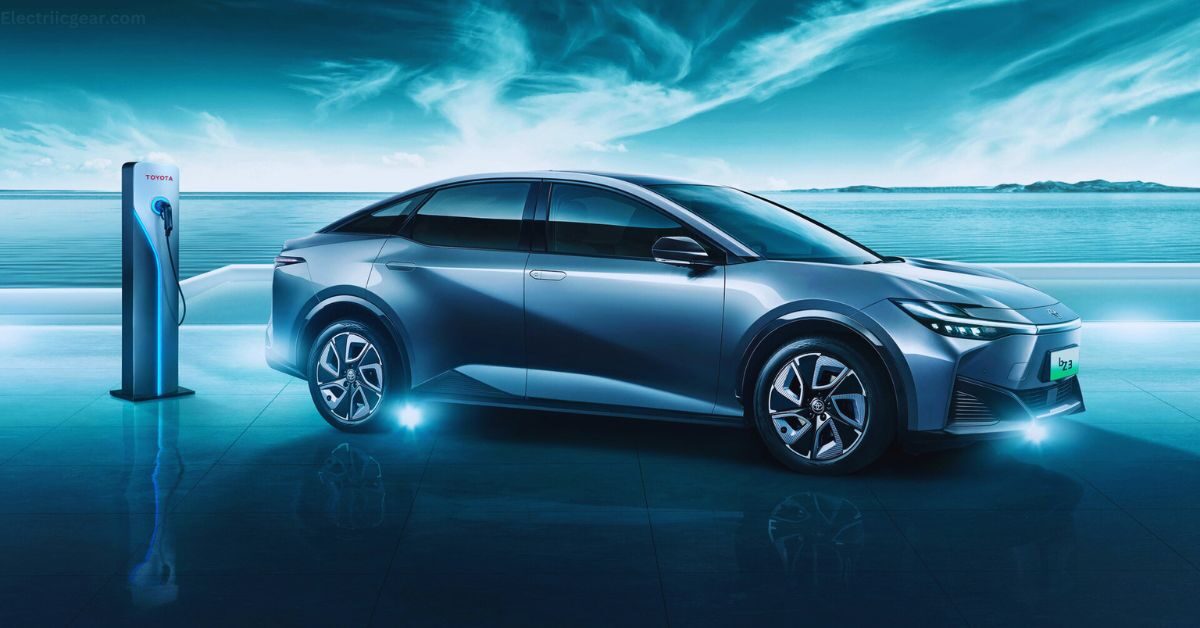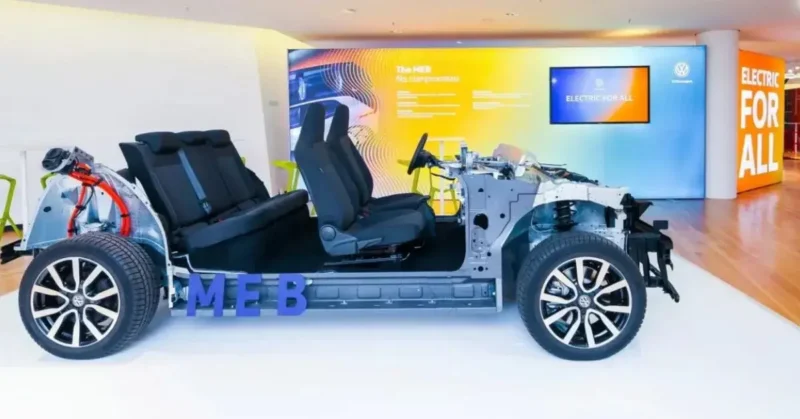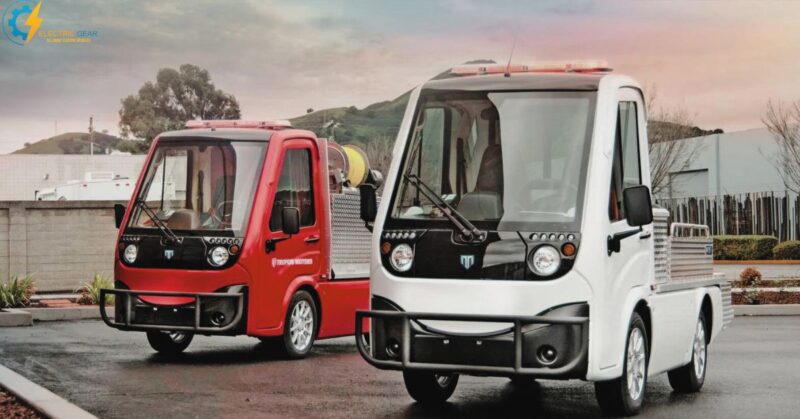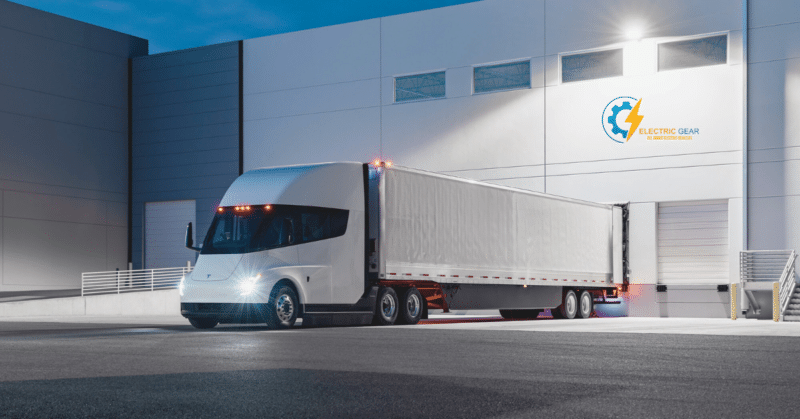Toyota Electric Vehicles: A Look into the Future of Sustainable Transportation
The demand for electric cars (EVs) is rising as the world’s attention turns more and more to renewable energy sources. Major manufacturers like Toyota have upped their game to fulfill this demand, which has resulted in a huge change in the automotive industry in favor of electric vehicles.
This article will examine the transition of Toyota EV technology, its present product lineup, and what the business has planned for the future.
Toyota’s Journey Towards Electric Vehicles:
Toyota has consistently been at the forefront of automobile innovation. Toyota has constantly pushed the limits of feasible sustainable mobility, from launching the Prius, the first hybrid car to be mass-produced, to its latest entry into electric vehicles. In this essay, we’ll examine the transition of Toyota electric vehicles and how they’ve risen to the top of this quickly changing market.
The Early Days of Hybrid Technology
The 1997 release of the Prius Toyota plug-in hybrid marked the beginning of the transition of Toyota’s electric vehicle lineup. The Prius was the first Toyota hybrid electric vehicle to be mass-produced. It was among the more environmentally friendly Toyota electric vehicles and more fuel-efficient than cars running on gasoline. Consumers loved the Prius, and Toyota swiftly took the lead in hybrid engineering.
Toyota kept advancing its hybrid technology over time, making it more cost-effective and efficient. The Camry, Highlander, and RAV4 are just a few popular cars they introduced in hybrid form.
The Introduction of Toyota Electric Vehicles
Toyota was aware that electric vehicles were the future of sustainable transportation despite their success with hybrid technology. Toyota and Tesla partnered in 2012 to produce an electric variant of their popular RAV4 SUV. The limited production of the RAV4 EV demonstrated Toyota’s commitment to electric vehicles.
Toyota introduced the Mirai in 2015, a hydrogen fuel cell vehicle that generates electricity via a chemical reaction between hydrogen and oxygen. The Mirai was a revolutionary vehicle, but its production was costly, and the infrastructure for hydrogen fuel cell vehicles was inadequate.
Toyota’s Commitment to Electric Vehicles
Toyota remained committed to electric vehicles despite the difficulties with the Mirai. The company announced in 2017 that it would release an all-electric vehicle by 2020. In addition, plans for an electric version of the Lexus NX SUV were announced.
In 2019, Toyota unveiled the bZ4X concept, an all-electric SUV that will be the first model released under the company’s new Beyond Zero brand. The bZ4X is constructed on the Toyota e-TNGA platform, designed specifically for electric vehicles. It is anticipated that the bZ4X will have up to 400 miles range on a single charge, making it an excellent option for extended road journeys.
Toyota’s Current Offerings in Electric Vehicles
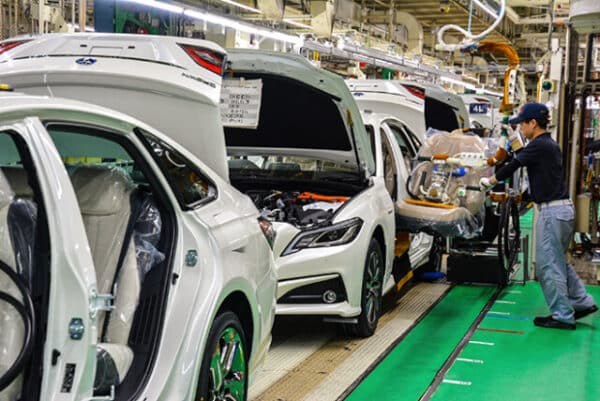
Toyota’s electric vehicles (EVs) current offerings were limited compared to some of its competitors. Toyota intends to expand its EV lineup over the next few years.
At the time, Toyota offered two electric vehicles:
- Toyota RAV4 EV: The well-known SUV from Toyota is also available in the US in an all-electric variant. It can be charged using a regular home outlet or a fast charger and ranges around 150 miles per charge.
- Toyota Mirai: Hydrogen gas produces energy to power the electric motor in this hydrogen fuel cell electric automobile. It can go around 312 miles on a single hydrogen tank; its sole outgoing exhaust is water vapor.
In addition, Toyota also offered several hybrid vehicles, which combine gasoline engines with electric motors to improve fuel efficiency:
- Toyota Prius: The Toyota Prius was one of the first hybrid vehicles available on the market and has since become a popular model. It achieves approximately 54 miles in combined city and motorway travel.
- Toyota Camry Hybrid: The Camry Hybrid is a hybrid variant of the prevalent Toyota Camry sedan. It achieves approximately 47 miles in combined city and motorway travel.
- Toyota Highlander Hybrid: Toyota’s hybrid version of their Highlander midsize SUV. It can get about 35 mpg with city and highway driving.
Toyota aims to sell more than 5.5 million electrified cars by the year 2030, including more than 1 million zero-emission vehicles. (BEVs, FCEVs). By 2025, the business intends to release at least 15 new battery-electric vehicles (BEVs) for the North American market, including a small SUV and a big SUV. Toyota is also working on solid-state batteries, which it claims will be more efficient and have greater ranges than lithium-ion batteries.
The Toyota bZ4X: Toyota’s First All-Electric SUV
Toyota has announced the bZ4X, its first fully electric SUV, which will be offered for sale in selected countries in 2022.
Toyota’s new “Beyond Zero” (bZ) line of electric cars, which the firm intends to extend in the next years, includes the bZ4X. Based on Toyota’s e-TNGA platform, made exclusively for electric vehicles, the bZ4X was co-developed with Subaru.
Toyota claims that the bZ4X can go up to 500 kilometers (310 miles) on a single charge and can rapidly recharge. The car has a distinct look, with a big grille and a roomy cabin designed with the driver and passengers in mind.
The bZ4X is equipped with Toyota’s latest safety and driver assistance technologies. It includes a new advanced driving assist system that provides steering support and helps keep the vehicle centered in its lane.
Toyota aims to sell 5.5 million electrified cars annually by 2030, and the bZ4X is a significant step toward achieving that goal. The bZ series will expand by introducing a small crossover, a midsize SUV, and a big SUV, all of which will run on electric power.
Lexus UX 300e: Toyota’s Luxury Electric Crossover SUV

Along with the Toyota bZ4X, Lexus, Toyota’s luxury car brand, has introduced the UX 300e, a high-end electric crossover SUV, to the market.
In 2020, the Lexus UX 300e debuted in Europe and China. Other regions are anticipated to get the vehicle in the future. It has the same platform as the current gasoline-powered UX crossover but an all-electric drivetrain.
With a front-mounted electric motor that produces 201 horsepower and 221 lb-ft of torque and a 54.3 kWh battery, the UX 300e has a range of up to around 186 miles (300 kilometers) on a single charge. An electric car in its class can reach 60 mph in 7.5 seconds, which is decent.
The UX 300e has a 10.3-inch infotainment touchscreen, head-up display, and 360-degree camera system.
The Lexus UX 300e, like the bZ4X, is a crucial step for Toyota and Lexus as they extend their electric vehicle lineup and satisfy their emissions reduction and sustainable mobility objectives.
Toyota’s Ambitious Goal of 70 Electrified Models by 2025
By 2025, Toyota plans to have 70 electrified cars worldwide. Both battery-electric vehicles (BEVs) and hybrid electric cars fall under this category. (HEVs).
This objective, a component of Toyota’s larger plan to get its carbon-neutral vision by 2050, demonstrates its dedication to lowering emissions, advancing sustainable transportation, and producing zero-emission Toyota vehicles.
Toyota intends to release at least 15 new battery-electric vehicles (BEVs) by 2025 to meet this objective, including seven Toyota brands and eight Lexus models. The e-TNGA platform from Toyota, made exclusively for electric cars, will be used to assemble these BEVs.
Toyota wants to increase the number of hybrid electric vehicles (HEVs) and plug-in hybrid electric cars in its range in addition to BEVs. (PHEVs). With well-known models like the Toyota Prius, the business has already established itself as a market leader in the hybrid segment. Additional HEV and PHEV vehicles are also expected to be released in the upcoming years.
Overall, Toyota’s ambition to have 70 electrified cars in its range by 2025 is ambitious, but it demonstrates its dedication to encouraging sustainable transportation and lowering emissions. Toyota is a powerhouse in the automotive sector, so its attempts to switch to electric cars might have a big influence on how people travel in the future.
The Electric Toyota 86: An Iconic Sports Car Goes Electric
In some markets, there was no official announcement from Toyota about an electric version of the Toyota 86 sports car, also known as the Subaru BRZ.
While Toyota has been focusing on expanding its lineup of hybrid and electric vehicles, an electric version of the Toyota 86 could be developed in the future, given the company’s commitment to reducing emissions and promoting sustainable mobility. However, it is important to note that the company has not officially confirmed plans for a potential electric Toyota 86.
Toyota’s e-TNGA Platform: A New Era for Electric Vehicles
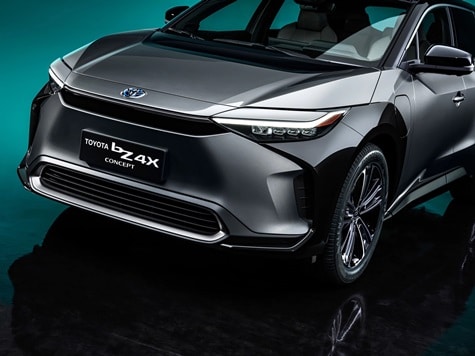
In 2020, Toyota announced its brand-new, modular e-TNGA platform for electric vehicles. From tiny city cars to bigger SUVs and even commercial vehicles, this platform is made to accept a variety of electric vehicles. The e-TNGA platform is a crucial component of Toyota’s strategy to achieve carbon neutrality by 2050. It is anticipated to serve as the foundation for a new generation of electric cars.
The versatility of the e-TNGA platform is one of its main advantages. Toyota can produce a range of electric cars to satisfy various market demands because of the design’s ability to support multiple battery sizes, electric motors, and drivetrains. Toyota can produce functional and fashionable automobiles because of the platform’s adaptability to various body types and designs.
Scalability is another benefit of e-TNGA technology. Using the same platform to build cars of various sizes and market sectors, Toyota can use economies of scale and lower production costs. Additionally, it would be simpler for Toyota to fulfill the rising demand for electric vehicles in many global markets.
The e-TNGA platform is created with safety in mind, flexibility, and scalability. The platform has a low center of gravity, which will aid in stability and handling, particularly in vehicles with higher bodywork, such as SUVs. The platform also includes sophisticated safety technologies, including collision avoidance systems and pedestrian identification, to decrease the chance of accidents.
Beyond Zero: Toyota’s New Brand for Sustainable Transportation
Toyota established Beyond Zero in 2021 to promote sustainable transportation alternatives. The company offers a variety of electric and hybrid cars, as well as various modes of transportation like bicycles and scooters. Toyota’s dedication to going beyond zero emissions and creating a more sustainable future is reflected in the term “Beyond Zero.”
Toyota wants to deliver 15 new electric cars under the Beyond Zero brand by 2025, including battery-electric, plug-in hybrid, and fuel-cell vehicles. The brand will also create new mobility services like car-sharing and ride-hailing to decrease vehicle traffic and enhance urban mobility.
The Beyond Zero brand incorporates a commitment to social and environmental responsibility and emphasizes sustainable mobility. Toyota’s objective is to achieve net-zero carbon emissions from its operations by 2050, and the firm is trying to decrease its environmental effect across its supply chain.
Toyota Electric SUV
As far as Toyota’s electric SUVs are concerned, it released its electric SUV in 2022, based on its e-TNGA platform, which travels up to 300 miles on a single charge. The vehicle is expected to be called the Toyota bZ4X, the first of several electric SUVs released under the brand’s bZ (Beyond Zero) lineup.
The concept of bZ4X was unveiled at the 2021 Shanghai Auto Show, featuring a futuristic design with a spacious interior and advanced technology, including a solar-powered ventilation system. Toyota plans to have seven bZ electric vehicles available globally by 2025.
Price of Toyota Electric SUV: The Limited trim starts at $46,700. Add another $2,080 to both figures for the second electric motor that facilitates all-wheel drive.
Toyota Electric Truck
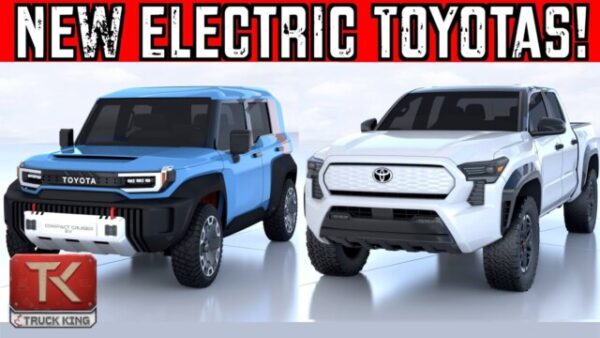
Toyota plans to introduce an electric truck, entering the expanding market for commercial vehicles with zero emissions. Based on the company’s well-liked Tundra pickup truck, the car is anticipated to have a 300-mile range between charges, making it appropriate for long-distance travel.
Additionally, it will have a payload capability of up to 2,000 pounds and a towing capacity of up to 12,000. Toyota’s larger objective of lowering its carbon impact and moving toward a carbon-neutral society includes the electric truck. By 2035, the business wants to electrify every vehicle in its inventory, and by the end of 2022, the electric Tundra was ready for sale.
Toyota Electric Car Battery
Toyota is determined to develop reliable, safe, affordable, and efficient electric car batteries. It invests in advanced EV battery technology to enhance energy density, reduce weight, and for better performance. Toyota’s EV batteries are made of lithium-ion and nickel-metal hydride (NiMH) technology, providing high power output, fast charging, and longer life.
The company is also exploring solid-state batteries, which have the better potential to offer even higher energy density and longer range. Toyota intends to create sustainable and reliable electric cars meeting the needs of consumers and contribute to a greener future.
Toyota Electric Vehicle Charging and Range
To promote driving comfort, Toyota aims to upgrade the infrastructure for charging its electric cars (EVs). In addition to providing home charging options for EV customers, the firm is collaborating with other companies to construct additional charging stations in public spaces.
Toyota’s long-range EVs are intended to reach over 300 miles on a single charge. The business is spending money on battery technology and energy-saving aerodynamic design to do this. Regenerative braking, another characteristic of Toyota EVs, aids in battery recharging while operating. The firm is dedicated to producing dependable and useful, consumer-friendly electric cars.
Solid-State Batteries: The Future of Electric Vehicles?
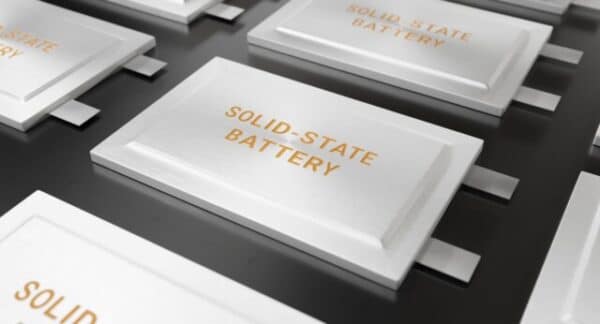
A brand-new battery technology called solid-state batteries has the potential to transform the market for electric vehicles completely. Solid-state batteries employ solid electrolytes instead of the liquid electrolytes used in traditional lithium-ion batteries, which may have several benefits.
The increased energy density of solid-state batteries is one of their key benefits. As a result, they can store more energy in the same amount of area, which might result in electric car battery packs that are lighter and smaller. Additionally, solid-state batteries are less likely to overheat and catch fire—two safety issues with conventional lithium-ion batteries.
The extended lifetime of solid-state batteries is another benefit. Solid-state batteries may live longer and need replacement less often than conventional lithium-ion batteries because solid electrolytes are less likely to degrade over time.
However, solid-state batteries aren’t without their own set of problems. The high price of production is a major obstacle. Until manufacturing costs come down for solid-state batteries, they won’t be as competitive as standard lithium-ion batteries. The scalability of the technology is also an issue since it has not been proven in a large-scale setting.
However, many industry experts still see solid-state batteries as the future wave for EVs. Major automakers, including Toyota, BMW, and Volkswagen, have already begun investing in and developing solid-state batteries for consumer use.
If developed, solid-state batteries might revolutionize the electric car market by boosting range, enhancing safety, and decreasing pollution.
Toyota’s Carbon-Neutral Vision
Toyota’s Contribution to a Greener Future With Electric Vehicles.
In the automobile sector, Toyota has been at the forefront of the development of greener technology. The corporation’s selection of electric vehicles has substantially contributed to a more environmentally friendly future.
Toyota EV uses cutting-edge hybrid and fuel cell technology in its electric vehicles, such as the Prius Prime and the Mirai, to emit fewer pollutants than conventional gas-powered vehicles.
Toyota EV is also making significant R&D investments to advance battery technology and lower the price of electric cars. By the early 2020s, the business plans to introduce more than 10 new electric cars worldwide, aiming to produce zero-emission vehicles.
Toyota’s dedication to sustainability extends not just to its goods but also to how they are produced. The business has included several environmentally friendly methods in its manufacturing, such as using renewable energy sources and reducing waste and water use.
What Can We Expect From Toyota in the Future?
Toyota has a lofty target of 70 electrified models, including 15 battery-electric cars, by 2025. Toyota intends to introduce several other electric vehicles over the next several years, including the bZ4X and the UX 300e.
The electric version of the renowned Toyota 86 sports car is one of the most eagerly awaited electric automobiles from Toyota. The electric 86 will provide an exhilarating driving experience and can travel up to 300 kilometers on a single charge.
Solid-state battery technology, which Toyota is also developing, has the potential to greatly extend the range and shorten the charging time of electric cars. Solid-state batteries are safer, more effective, and have a longer lifespan because they employ a solid electrolyte rather than a liquid one in conventional lithium-ion batteries.
Conclusion
Toyota is proactively switching to electric cars, and their dedication to environmentally friendly transportation is shown in their existing products and future plans. Toyota is poised to become a significant participant in the EV industry in the next years, with the bZ4X and UX 300e setting the pace with interesting electric vehicles like the 86 on the horizon.

Imran is an experienced content writer who crafts engaging and informative articles for a variety of industries. With a keen eye for detail and a passion for storytelling, Imran delivers high-quality content that resonates with readers. Whether he’s writing blog posts, social media content, or website copy, Imran is committed to delivering compelling content that drives results.

